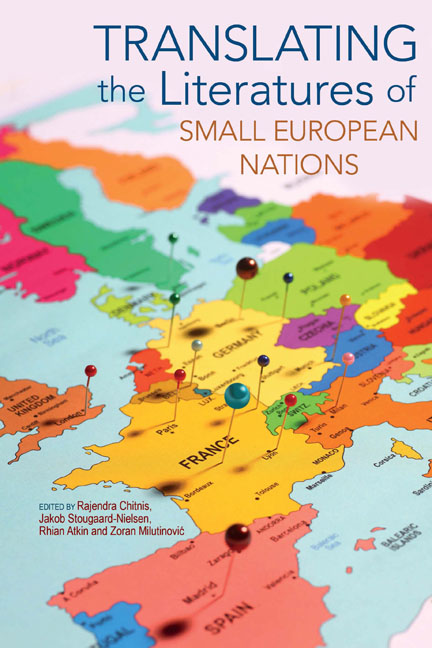Book contents
- Frontmatter
- Contents
- Acknowledgements
- Introduction
- 1 The Global Presentation of Small National Literatures: South Slavs in Literary History and Theory
- 2 Translators as Ambassadors and Gatekeepers: The Case of South Slav Literature
- 3 Supply-driven Translation: Compensating for Lack of Demand
- 4 Literature as Cultural Diplomacy: Czech Literature in Great Britain, 1918–38
- 5 Exporting the Canon: The Mixed Experience of the Dutch Bibliotheca Neerlandica
- 6 Creative Autonomy and Institutional Support in Contemporary Slovene Literature
- 7 Strategies for Success? Evaluating the Rise of Catalan Literature
- 8 Gender, Genre and Nation: Nineteenth-century Swedish Women Writers on Export
- 9 Translating as Re-telling: On the English Proliferation of C.P. Cavafy
- 10 Criminal Peripheries: The Globalization of Scandinavian Crime Fiction and Its Agents
- 11 Literary Translation and Digital Culture: The Transmedial Breakthrough of Poland's The Witcher
- 12 Towards a Multilingual Poetics: Self-translation, Translingualism and Maltese Literature
- 13 Does Size Matter? Questioning Methods for the Study of ‘Small’
- Coda: When Small is Big and Big is Small
- Index
3 - Supply-driven Translation: Compensating for Lack of Demand
- Frontmatter
- Contents
- Acknowledgements
- Introduction
- 1 The Global Presentation of Small National Literatures: South Slavs in Literary History and Theory
- 2 Translators as Ambassadors and Gatekeepers: The Case of South Slav Literature
- 3 Supply-driven Translation: Compensating for Lack of Demand
- 4 Literature as Cultural Diplomacy: Czech Literature in Great Britain, 1918–38
- 5 Exporting the Canon: The Mixed Experience of the Dutch Bibliotheca Neerlandica
- 6 Creative Autonomy and Institutional Support in Contemporary Slovene Literature
- 7 Strategies for Success? Evaluating the Rise of Catalan Literature
- 8 Gender, Genre and Nation: Nineteenth-century Swedish Women Writers on Export
- 9 Translating as Re-telling: On the English Proliferation of C.P. Cavafy
- 10 Criminal Peripheries: The Globalization of Scandinavian Crime Fiction and Its Agents
- 11 Literary Translation and Digital Culture: The Transmedial Breakthrough of Poland's The Witcher
- 12 Towards a Multilingual Poetics: Self-translation, Translingualism and Maltese Literature
- 13 Does Size Matter? Questioning Methods for the Study of ‘Small’
- Coda: When Small is Big and Big is Small
- Index
Summary
The most widespread translation practice is non-translation; it is normal that most texts and utterances are never translated. If everything had to be translated, the resource implications alone would leave humanity in serious trouble. It nevertheless makes sense to study the phenomenon of non-translation in two contexts: first, when it is artificially induced (through censorship or ideological embargo) (see Duarte, 2000; Špirk, 2014) and second, when, as discussed in this chapter, individuals or institutions struggle against non-translation, as in the case of less widely translated European literatures. To understand the logic of these interventions in international literary flows, I will approach translation from the perspective of supply and demand.
Understanding Demand-driven Translation
Because of the time and effort required, it is much easier to find a reason for not translating a text or utterance. Demand is widely considered a key motivation for literary translation; someone (a particular person or an undefined set of individuals) in the target culture sees a book or a series of books (a repertoire, genre) in another culture, observes that it is missing in the target culture and that it may be useful in some way, and makes the decision to get it translated. As Gideon Toury (2012, 21–22) puts it:
Work on this chapter was supported by funding from the European Union’s Horizon 2020 Research and Innovation Programme under the Marie Skłodowska-Curie Grant Agreement No.749871. cultures resort to translating precisely as a way of filling in gaps, whenever or wherever such gaps may manifest themselves: either in themselves, or (more often) in view of a corresponding non-gap in another culture that the target culture in question has reasons to look up to and try to exploit for its own needs.
For example, consider the German interest in Scandinavian literature in general and Henrik Ibsen (1828–1906) in particular in the nineteenth century. Although the German openness towards Scandinavian literature was to some extent rooted in pan-Germanic cultural affinities, Ibsen and other Scandinavian authors of the late nineteenth-century boom were translated thanks to genuine interest in the new, radical voices of the source cultures. The demand-driven nature of these translations does not conflict with the fact that these translations were read in ways that somewhat contradicted their original reception and interpretation in their source cultures (see, for instance, Bruns, 1977; Gentikow, 1978; Baumgartner, 1979; Zernack, 1997).
- Type
- Chapter
- Information
- Translating the Literatures of Small European Nations , pp. 48 - 68Publisher: Liverpool University PressPrint publication year: 2019



